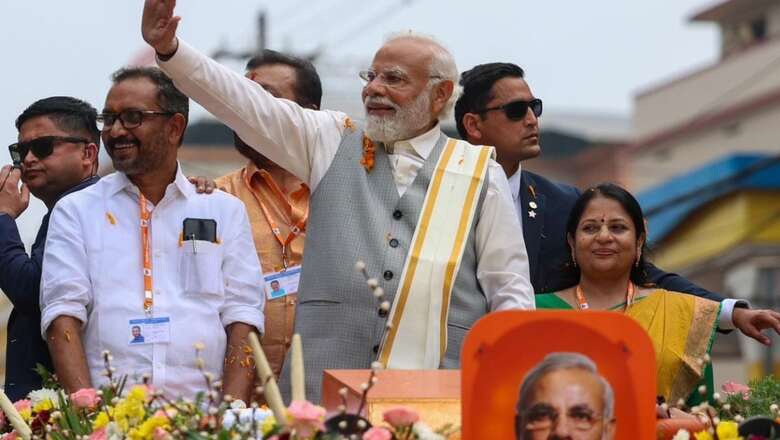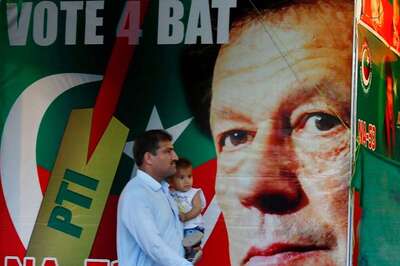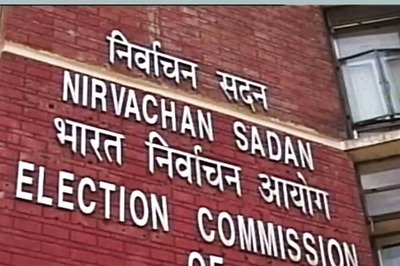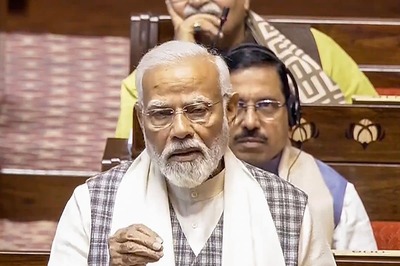
views
The unequivocal triumph of the Bharatiya Janata Party (BJP) in the Hindi heartland states of Rajasthan, Madhya Pradesh and Chhattisgarh has serendipitously solidified the formidable leadership of Prime Minister Narendra Modi, preceding the general elections of 2024, paving the way for his unchallenged third term. The electoral resolute decision in the triad of Hindi heartland states, even in the absence of a designated chief ministerial figure in the state election fray, is a palpable indicator of the enduring emotional rapport that PM Modi enjoys.
However, this grandiose victory was beyond the facade; beneath it, you’ll see that the Indian electorates, often compared to ‘indecisive squirrels’, actually have a deeper understanding than it seems. It won’t be self-approving on the part of the writer to portend that voters have furthered their confidence in Modi’s efficacious implementations, based on his systematic administration of welfare distribution and audacious holistic reforms.
The core of the BJP’s electoral success resides in the burgeoning electoral consciousness that is now progressively demonstrating reluctance towards acquiescing to the enticement of unmerited subsidies, often known as revadis. The recent Congress electoral campaign in Rajasthan—where the party had pledged many attractive benefits like an annual honorarium of Rs 10,000 to the women head of the family, a zero bill for users consuming up to 100 units of free electricity, free smartphones with three years of free internet, and many more—serves as the most recent exemplar, illustrating how the practical outcome of these promised free or subsidised services does not always align with electoral success and often underscores the complexity and potential pitfalls in accordance with the pragmatic realities of economic governance.
However, these populist assurances are inordinate and unattainable. MG Chandrakanth, retired director of the Institute for Social and Economic Change (ISEC) noted about Karnataka, “Currently, the fiscal deficit is about Rs 60,531 crore, and adding Rs 65,082 crore amounts to a total deficit of Rs 1,25,613 crore. This is not sustainable as the deficit goes beyond 3 per cent.” Nevertheless, the decisive ascendancy of the BJP irrefutably indicates that the citizenry in India discerns freebie politics, realising that such policies pose a substantial impediment to the nation’s sustained developmental trajectory. The Congress must realise that their charming populist pledges are long past their relevance, and the proverbial short memory of the people is a distant memory.
Furthermore, the conspicuous electoral victory of the BJP is a resounding ratification of its inclusive policy of ‘Sabka Saath, Sabka Vikas’. In fact, in the ceremonial foundation-laying of the grand Ram Mandir, PM Modi, with sagacity, explained that Shri Ram is like the essential glue that brings together the diverse pieces of Bharat. “The entire country is thrilled and emotional, and crores of people would not be able to believe that they are watching this day in their lifetime,” said PM Modi. Stating that the grand Ram Mandir will be a modern symbol of our culture, eternal faith, and national spirit and inspire humanity forever, he added, “Ram belongs to all and is in everyone.”
Through constant affirmations, PM Modi has solidified his unwavering commitment towards nurturing a nation characterised by diverse elements coalescing into unity, encapsulated in the slogan ‘Ek Bharat-Shreshtha Bharat’. On the contrary, it transpires that the constructs within the Congress party postulate that the Indian populace will succumb to the schism between the northern and southern regions of India. The Congress party’s unceasing endeavour to perpetuate an aggravated discord between the two segments is evident from the onset of their political campaign.
Rahul Gandhi, while in Kerala, suggested that he thinks people in South India show more interest in important matters, while people in North India tend to focus on superficial things. In the aftermath of the Congress party’s triumph in Telangana and Karnataka, a semblance of confidence has emerged, suggesting that the standing in the southern states is impervious. Contrarily, such perceptions do not align with the prevailing circumstances. The Grand Old Party appears to be remiss in comprehending that the BJP is the single biggest party in south India in the Parliament. It has 29 MPs from the South, compared with the Congress’s 28, followed by the DMK’s 23. In fact, in a notable feat, the BJP increased its strength in the Telangana assembly from one seat to eight seats and achieved a twofold electoral sway from 7 per cent in 2018 to 14 per cent in 2023.
It’s ironic that the Congress party, known for its involvement in caste-based politics, is trying to bring Hindus together nationwide while cleverly using caste considerations for political gains. But PM Modi’s strategy in navigating the landscape of caste-based politics attests that Indian electorates have distanced themselves from the deleterious realm of caste-driven politics. As he promulgates publicly, “I was continuously saying that for me, only four castes are the biggest in the country—our women power, our youth, our farmers, and our poor families. It is only by empowering these four castes that the country is going to be strengthened.” Paradoxically, the Congress party’s political methods have only strengthened the BJP’s position as the leading contender for the 2024 general elections.
PM Modi has reshaped the landscape of contemporary governance for the Indian populace, eschewing the conventional segmentations rooted in caste, creed, and religion. Instead, his governance paradigm prioritises astute administration concerning welfare, developmental initiatives, economic empowerment, and consequential social reforms. Over the years of Modi’s administration, there has been a proclivity to dwell upon monumental landmarks such as the abrogation of Article 370, the implementation of GST, the realisation of the Ram Mandir, a successful G20 presidency, Chandrayan-3’s moon landing near the lunar south pole, and an economic growth of 7 per cent, among many others. One often tends to miss the wood for the trees!
But in reality, the ace up Narendra Modi’s sleeve is his unique paradigm of welfare schemes, comprising the distribution of cooking gas connections, Swachh Bharat Abhiyan, the facilitation of potable tap water, the initiation of direct monetary transfers to farmers through the PM Kisan programme, and many other distinctive forms of welfarism.
The trinity of JAM—Jan Dhan, Aadhaar and Mobile—did wonders for the BJP and Bharat, by and large. The positive outcomes of this situation and the consistent losses of the Congress party in various state elections send a clear signal that the divisive political tactics, giving out freebies, and resorting to tricky language have been handed a pink slip by Indian voters. The multitude of signposts that allude to the prevailing sentiment within the nation foreshadow an incremental advantage for the BJP in the shadow of PM Narendra Modi’s 3.0 wave.
Yuvraj Pokharna is an independent journalist and columnist. He tweets with @iyuvrajpokharna. Here’s the link to Yuvraj’s official WhatsApp channel: https://whatsapp.com/channel/0029VaBKt038vd1QvwLPp515. Views expressed in the above piece are personal and solely that of the author. They do not necessarily reflect News18’s views.




















Comments
0 comment